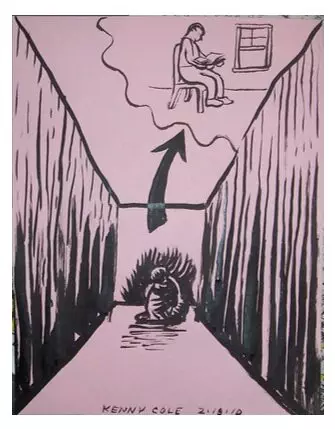
Donate to the Linda McKay-Panos Scholarship Fund

Donate to the Linda McKay-Panos Scholarship Fund
Photo: Flickr/ Kenny Cole
By Linda McKay-Panos
Reposted from LawNow 44(4) with permission
Mahatma Ghandi once said: “A nation’s greatness is measured by how it treats its weakest members.” Canada has used solitary confinement for prisoners for decades. In the past several years, solitary confinement has been the subject of criticism from civil libertarians and mental health advocates.

By Linda McKay-Panos
Reposted from LawNow 44(4) with permission
Photo: Flickr/ Kenny Cole
Mahatma Ghandi once said: “A nation’s greatness is measured by how it treats its weakest members.” Canada has used solitary confinement for prisoners for decades. In the past several years, solitary confinement has been the subject of criticism from civil libertarians and mental health advocates.
Usually, solitary confinement involves isolating inmates in a small cell without human contact for 22 hours per day. Often called “administrative segregation”, solitary confinement has been the subject of increased scrutiny because of suicides and mental health issues suffered by prisoners who may be held for years in isolation. In A Sourcebook on Solitary Confinement, Dr. Sharon Shalev (2008), a leading international authority on solitary confinement, states that between one-third and 90% of prisoners experience some negative impacts of long-term solitary confinement. The symptoms may include insomnia, confusion, feelings of hopelessness and despair, distorted perceptions and hallucinations.
For over 20 years, the Correctional Investigator has criticized the overuse of solitary confinement in Canada. For example, see the Annual Report of the Office of the Correctional Investigator 2014-2015 (Annual Report, 2014-2015). The Correctional Investigator notes that solitary confinement is overused particularly for women with mental health issues, and for Indigenous and Black inmates.
The practice of administrative segregation is now called “Structured Intervention”.In 1992, the Corrections and Conditional Release Act, SC 1992, c 20 (CCRA), originally provided procedural safeguards for administrative segregation in sections 31 to 37. These may be summarized as:
Release from administrative segregation at the earliest appropriate time.
Reasonable alternatives to administrative segregation must first be explored and exhausted.
Inmates in administrative segregation have the same rights as those in the general inmate population, except those that cannot be exercised due to limitations specific to administrative segregation or security requirements.
The Correctional Service Canada shall take into consideration an offender’s state of health and health care needs in all administrative segregation decisions (Annual Report, 2014-2015).
There are also international guidelines called the UN Standard Minimum Rules for the Treatment of Prisoners (also called the Nelson Mandela Rules). Rules 43 to 45:
prohibit indefinite or prolonged solitary confinement (over 15 days);
provide that solitary confinement is to be used only exceptionally; and
prohibit use for prisoners with mental or physical health disabilities that will be exacerbated by it.
While not legally binding, Canadian courts will turn to these rules for guidance.
In British Columbia Civil Liberties Association v Canada (Attorney General), 2019 BCCA 228, the B.C. Court of Appeal considered whether solitary confinement violates a person’s s. 7 Charter right to life, liberty and security of the person, and the right not to be deprived thereof except in accordance with the principles of fundamental justice. The Court confirmed that the 1992 CCRA provisions authorizing indefinite and prolonged solitary confinement, and internal rather than external review of decisions to segregate inmates in solitary confinement, violated these rights. The Court suspended the declaration of invalidity for one year.
For over 20 years, the Correctional Investigator has criticized the overuse of solitary confinement in Canada.In Canadian Civil Liberties Association v Canada (Attorney General), 2019 ONCA 243, the Ontario Court of Appeal provided, among others, that the CCRA provisions permitting administrative segregation for over 15 consecutive days violated a person’s s. 12 Charter right to freedom from cruel and unusual punishment. The Court found the violation could not be saved by s. 1 of the Charter (reasonable and justifiable violations).
The Supreme Court of Canada recently granted leave to the federal government to appeal these two cases (jointly). (See February 13, 2020 case nos. 38574 and 38814.)
Sections 31 to 37 of the CCRA were amended in November 2019. The practice of administrative segregation is now called “Structured Intervention”. The Canadian Civil Liberties Association notes:
These [structured Intervention] units continue to house inmates in situations of extreme isolation, however inmates are now supposed to be provided four hours daily out of cell and (or including) two hours daily of meaningful human contact, subject to certain exceptions and exclusions. In addition, after hearing from CCLA and others, the law now includes a system of independent decision-makers to review decisions concerning keeping inmates in the SIUs, to consider their conditions, and to review the situation of people with mental health issues in the SIUs. The new law also addresses certain mental health supports and supports for Indigenous inmates.
However, prisoner’s advocates argue that these amendments do not adequately address the concerns about solitary confinement. For example, the new provisions do not set a time limit on solitary confinement. Thus, the federal government did not adequately address concerns about the harms. Advocates do not believe a new name is adequate to address the consequences of the practice of solitary confinement. (See: J. Bronskill, (13 Feb 2020) National Post “Supreme Court of Canada to examine solitary confinement in federal prisons”.)
Many inmates return to society eventually. It is in all of our interests to ensure they do not suffer irreversible harms while in indefinite solitary confinement.




2500 University Drive NW
Calgary, AB T2N 1N4
(403) 220-2505
aclrc@ucalgary.ca